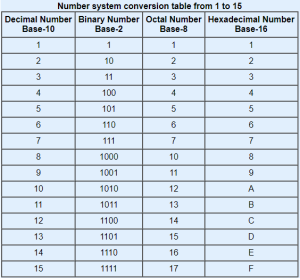Entrance Announcement
MICTE 2080
2080 Magh 07
User:Elina Real Teaching Lesson Plan 2: Difference between revisions
Jump to navigation
Jump to search
mNo edit summary |
|||
| (One intermediate revision by one other user not shown) | |||
| Line 65: | Line 65: | ||
== Class room activity: == | == Class room activity: == | ||
* | * Assign a task an Allow students to work individually or in pairs to solve these problems. | ||
'''Task 1:Convert (A5B)16 into octal number.''' | '''Task 1:Convert (A5B)16 into octal number.''' | ||
| Line 78: | Line 78: | ||
* Summarize a key points about today topics; | * Summarize a key points about today topics; | ||
* Encourage a | * Encourage a student to ask a questions; | ||
== Assessment: == | == Assessment: == | ||
| Line 88: | Line 88: | ||
# (ABC)16 into octal number | # (ABC)16 into octal number | ||
# (1BC)16 into octal number | # (1BC)16 into octal number | ||
__NOTOC__ | |||
[[Category: BICTE]] | |||
[[Category: Lesson Plan]] | |||
Latest revision as of 03:18, 12 March 2024
Subject: Computer Science Unit:12
Class: 8 Topic:Octal and Hexadecimal number system
Time:45 min Period: 7th
No of students:64 School:Adarsha Secondary school
Specific Objectives:
At the end of this class,Student will be able to:
- Understand the concept of octal and hexadecimal number system;
- Understand the steps of converting octal into hexadecimal and hexadecimal into octal number system;
- solve the conversion between hexadecimal into octal and octal into hexadecimal number system.
Teaching Material:
- white board, dustor and marker;
- Laptop and Projector.
Introduction:
- Begin by asking a question about Octal and hexadecimal number system.
- Encourage them to share their thought.
- Explain the steps of converting octal into hexadecimal and hexadecimal into octal number system.
Types:
- Binary Number System
- Decimal Number Systen
- Octal Number System
- Hexadecimal Number System

Number system conversion table from 1 to 15
Octal Number System:
- Octal number system has only eight digit from 0 to 7.
- Every number (value) represents with 0,1,2,3,4,5,,6,7 in the number system.
- The base of octal number system is 8 ,because it has only 8 digits.
Hexadecimal Number System:
- Hexadecimal number system has 16 alphanumeric value from 0 to 9 and A to F.
- Every number (value) represents with 0,1,2,3,4,5,6,7,8,9,,A,B,C,D,E and F in this number system.
- The base of hexadecimal number system is 16, because it has 16 alphanumeric value.
- Here A is 10 , B is 11, C is 12 , D is 13 ,E is 14 and F is 15.
Octal to decimal conversion:
- Explain the process of converting an octal number to its binary equivalent using a step-by-step method.
- write a each step of conversion process in whiteboard and provides basic example.
Hexadecimal to octal Conversion:
- Explain how to convert a hexadecimal number to its binary equivalent and then to octal.
- Work through examples and problems on the board, students should involve in this process.
Class room activity:
- Assign a task an Allow students to work individually or in pairs to solve these problems.
Task 1:Convert (A5B)16 into octal number.
Task 2:Convert (654)8 into hexadecimal number.
Task 3:Convert (360) into binary number.
- Encourage to the student to ask the question if they have any problem in any step.
Conclusion:
- Summarize a key points about today topics;
- Encourage a student to ask a questions;
Assessment:
- Convert the following number according to the given instruction:
- (240)10 into octal number
- (540)8 into hexadecimal number
- (ABC)16 into octal number
- (1BC)16 into octal number